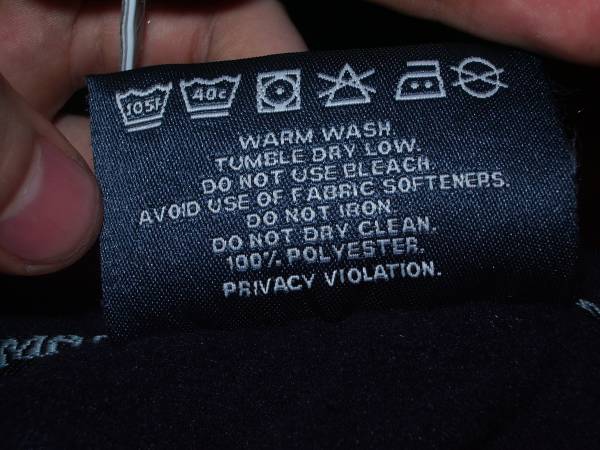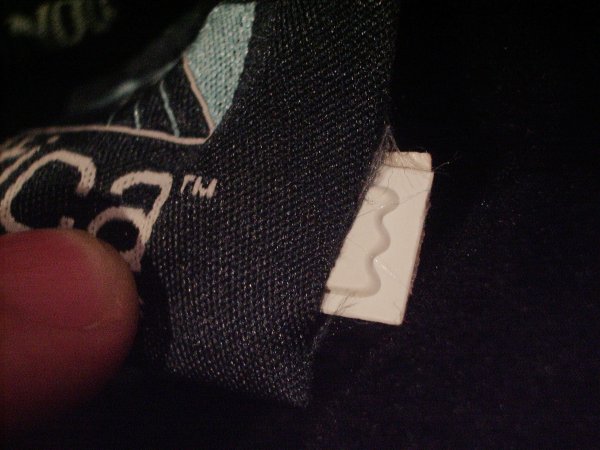RFID apparel
29 Sep 2005
I encountered my first piece of RFID tagged clothing yesterday, at Kathmandu. They’re having a sale and I picked up an awesome polar fleece warm thing for $30 (and this is a clearance center having a sale, so that was down from like… $180. Good stuff.).

I got home and did the usual tag-snipping-off thing, then at some point went to look under the tag for wash instructions, etc., and felt a lump inside it. I kinda squeezed it/twisted it for a bit, and was pretty sure it was one of those rectangular stickers you find on various products in stores these days.
So, it didn’t take much to get it out. The stitching on the side of the clothing tag looked pretty weak (understandable, as these things aren’t normally even sealed on the sides), and I squeezed it until it popped and there was an incision just big enough to extract the RFID bit.

Less than a minute later I had the tag out.

I’m not against RFID per se… so long as it stays in the store. If you’re going to use techniques like this, etiquette should dictate you tell your customers about it after they’ve bought the product. I’m not too worried about Kathmandu (except on principle), because they’re a privately-owned company that doesn’t have various other stores under its control. I do, however, have concerns with larger companies using these technologies (such as Coles Myer), because they can potentially track how often people are wearing clothing bought in their stores, and match the RFID code to the style of apparel, and match the item to a transaction number to an EFTPOS record to an individual. No thanks.
Admittedly, this is only in their stores. However, when you consider the scope of some retail groups’ ownership, cause for concern arises. The same companies that own clothing outlets and department stores also own grocery and supermarket chains. These are the kind of retail properties that people visit every day, or every few days. The potential for abuse here is astounding.
Retailers should at the least warn (or, for those who prefer euphemism, “inform”) purchasers at time of sale that their clothing contains an RFID tag, and provide instructions for removing this. The difficulty of removal isn’t particularly great either pre- or post-purchase, so perhaps that’s one reason they haven’t informed people of this until now. Well, consider that the polar fleece was marked down from $179 to $30… this suggests retailers have room to move. They have theft margins built into their pricing structures (heh, so if we don’t steal from them, they’re making more money than they should be!), but surely these margins should extend to conventional anti-theft technologies that infringe consumers’ rights less? What about those chunky round things that used to be stuck on clothes and removed at point of sale? (I don’t know what they’re called, but they were blindingly obvious, difficult to remove without a tool, and didn’t leave the store)
RFID is fine for all the supply chain stuff in the world… it just shouldn’t ever leave the store.